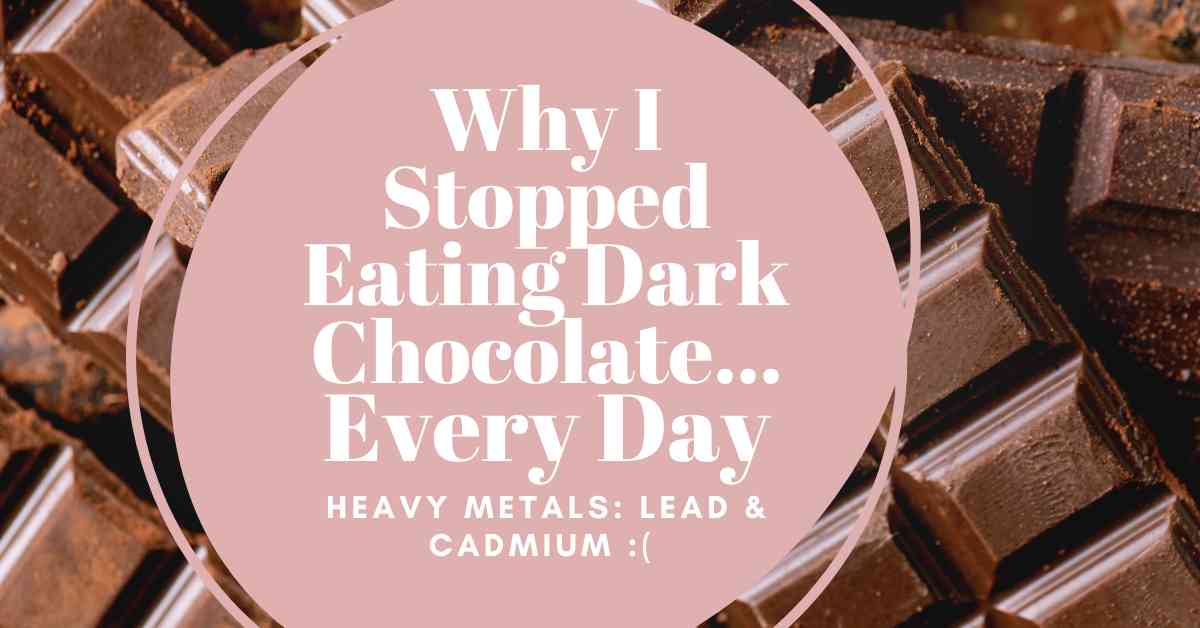Why I stopped eating dark chocolate…every day…at least for now
I have always been a SUPER fan of dark chocolate! I love the taste, the health benefits, how you don’t need much and it satisfies that sweet tooth. So a few years ago when I heard about a study and how chocolate may contain higher levels of heavy metals, well I just sort of ignored it.
However, a new study came out from consumer reports in 2022 showing high levels in both lead and cadmium in my favorite dark chocolate bar brands 🙁 So I’m taking caution for now, and actually stopped my daily intake of dark chocolate. It’s interesting, avoiding my daily chocolate habit was tough for a few days and after that I really didn’t crave much sugar so overall, bonus for my health! Anywho, I wanted to do some research in to heavy metals to understand why it’s occurring in dark chocolate, if it’s something that can be avoided, and to know which brands are currently testing high and low for heavy metals. This article is to help you make informed decisions on the type of chocolate you buy and eat.
Why is There Lead and Cadmium in Dark Chocolate?
Consumer Reports references this study to understand the reasons why heavy metals are found in dark chocolate. There are two main reasons why lead and cadmium occurs in dark chocolate:
- Lead: Lead gets into cacao after the beans are harvested. Lead is found on the outer shell of the bean (not the bean itself). Lead levels were low after beans were picked and increased as beans dried in the sun. They found that lead-filled dust and dirt accumulated on the beans.
- Cadmium: Cadmium occurs because cacoa plants take up cadmium from the soil and the metal accumulates in the cacao bean as the tree grows
Lead Health Concerns
Lead has negative health effects, especially for pregnant women and children. The World Health Organization states that “There is no level of exposure to lead that is known to be without harmful effects.
“Young children are particularly vulnerable to the toxic effects of lead and can suffer profound and permanent adverse health effects, particularly affecting the development of the brain and nervous system. Lead also causes long-term harm in adults, including increased risk of high blood pressure and kidney damage. Exposure of pregnant women to high levels of lead can cause miscarriage, stillbirth, premature birth and low birth weight.”
Cadmium Health Concerns
Prop 65 states the following health risks of cadmium:
- Prostate, Kidney, and Lung Cancer
- Birth Defects and Reproductive Harm
- Child’s development if exposed during pregnancy
Can Lead and Cadmium in Dark Chocolate Be Avoided?
So the good news is lead can be avoided by changing the way cacao is harvested and manufactured, this is according to consumer reports. It would include minimizing soil contact for the beans when they are dried in the sun, and to dry beans on tables or tarps with protective covers and away from soil.
Cadmium isn’t as easy to avoid, the study says it would involve “Carefully breeding or genetically engineering plants to take up less of the heavy metal could help, though that could take several years. Other potential options include replacing older cacao trees with younger ones, because cadmium levels tend to increase as the plants get older, and removing or treating soil known to be contaminated with cadmium.” Chocolatiers could also find cacao from growing areas with lower levels and blend beans from different areas.
Dark Chocolate Heavy Metal Tests
Consumer Report Heavy Metal Test Results
Consumer Reports tested 28 dark chocolate bars for the heavy metals, lead and cadmium. They used California’s max allowable dose for lead which is .5 micrograms and 4.1 mcg from cadmium. Below are the test results, and the percent is the percentage of the max allowable dose for one ounce of chocolate.
Safer Options: Dark Chocolate with Less Lead and Cadmium
So according to the tests from consumer reports, here are the safer options (lowest lead and cadmium count when compared to others):
- Mast Organic Dark Chocolate 80% Cocoa LEAD 14% CADMIUM 40%
- Taza Chocolate Organic Deliciously Dark Chocolate 70% Cacao LEAD 33% CADMIUM 74%
- Ghirardelli Intense Dark Chocolate 86% Cacao LEAD 36% CADMIUM 39%
- Ghirardelli Intense Dark Chocolate Twilight Delight 72% Cacao LEAD 61% CADMIUM 96%
- Valrhona Abinao Dark Chocolate 85% Cacao LEAD 63% CADMIUM 73%
Avoid: List of Dark Chocolate with Heavy Metals
Here are the chocolates to avoid for now and test higher in lead and cadmium according to consumer reports. They state “For 23 of the bars, eating just an ounce a day would put an adult over a level that public health authorities and CR’s experts say may be harmful for at least one of those heavy metals. Five of the bars were above those levels for both cadmium and lead. “
- Beyond Good Organic Pure Dark Chocolate: 70% Cocoa LEAD 42% CADMIUM 112%
- Beyond Good Organic Pure Dark Chocolate: 80% Cocoa LEAD 42% CADMIUM 138%
- Equal Exchange Organic Extra Dark Chocolate: 80% Cacao LEAD 45% CADMIUM 120%
- Lindt Excellence Dark Chocolate: 70% Cocoa LEAD 48% CADMIUM 116%
- Scharffen Berger Extra Dark Chocolate: 82% Cacao LEAD 49% CADMIUM 136%
- Alter Eco Organic Dark Chocolate Classic Blackout: 85% Cacao LEAD 49% CADMIUM 204%
- Pascha Organic Very Dark Dark Chocolate: 85% Cacao LEAD 68% CADMIUM 253%
- Dove Promises Deeper Dark Chocolate: 70% Cacao LEAD 74% CADMIUM 112%
- Tony’s Chocolonely Dark Chocolate: 70% Cocoa LEAD 134% CADMIUM 28%
- Lily’s Extra Dark Chocolate: 70% Cocoa LEAD 144% CADMIUM 42%
- Godiva Signature Dark Chocolate: 72% Cacao LEAD 146% CADMIUM 25%
- Chocolove Strong Dark Chocolate: 70% Cocoa LEAD 152% CADMIUM 60%
- Lindt Excellence Dark Chocolate: 85% Cocoa LEAD 166% CADMIUM 80%
- Endangered Species Bold + Silky Dark Chocolate: 72% Cocoa LEAD 181% CADMIUM 31%
- Trader Joe’s Dark Chocolate: 72% Cacao LEAD 192% CADMIUM 36%
- Hu Organic Simple Dark Chocolate: 70% Cacao LEAD 210% CADMIUM 56%
- Chocolove Extreme Dark Chocolate: 88% Cocoa LEAD 240% CADMIUM 83%
- Hershey’s Special Dark Mildly Sweet Chocolate: LEAD 265% CADMIUM 30%
- Theo Organic Pure Dark: 70% Cocoa LEAD 120% CADMIUM 142%
- Trader Joe’s The Dark Chocolate Lover’s Chocolate: 85% Cacao LEAD 127% CADMIUM 229%
- Theo Organic Extra Dark Pure Dark Chocolate: 85% Cocoa LEAD 140% CADMIUM 189%
- Lily’s Extremely Dark Chocolate: 85% Cocoa LEAD 143% CADMIUM 101%
- Green & Black’s Organic Dark Chocolate: 70% Cacao LEAD 143% CADMIUM 181%
As You Sow Heavy Metal Test Results
As You Sow tests heavy metals in chocolate and actually has studies going back to 2014. There are more mainstream brands in this test and it includes hot chocolate. Here are the test results.
If you want hot chocolate then Wild Harvest Organic Rich Chocolate Hot Cocoa Mix would be your best option which was tested in March 2022.
Does Milk Chocolate Have Lead and Cadmium?
I’m reading that dark chocolate is higher in heavy metals because it uses more cacao and that’s where the heavy metals are coming from. So milk chocolate probably has lower lead and cadmium levels.
So Do I have to Give Up Dark Chocolate?!!?!
No need to give up dark chocolate altogether, just be sure to make informed decisions and eat it in moderation. If you are eating dark chocolate every day (like myself and 15% of us) it would be wise to minimize the chocolate intake since it could be harmful due to the presence of heavy metals like lead and cadmium. According to consumer reports, “for 23 of the bars, eating just an ounce a day would put an adult over a level that public health authorities and CR’s experts say may be harmful for at least one of those heavy metals.”
To ensure safe consumption, refer to both Consumer Reports studies and As You Sow tests when selecting bars. That way, you can minimize your exposure to unwanted chemicals and enjoy chocolate guilt-free!
I’ll be keeping my eye on these studies, I’m hoping chocolate makers take action towards reducing the lead and cadmium in the cocao beans being used.
Final Thoughts
In conclusion, it is important to be mindful when purchasing and consuming dark chocolate due to its potential levels of heavy metals like lead and cadmium. Be sure to refer to Consumer Reports studies and As You Sow to find chocolate bars with less heavy metals. With informed decisions, you can still enjoy your favorite dark chocolate bars without the fear of having any undesired health effects. Bon Appétit!
Brekke Jo







